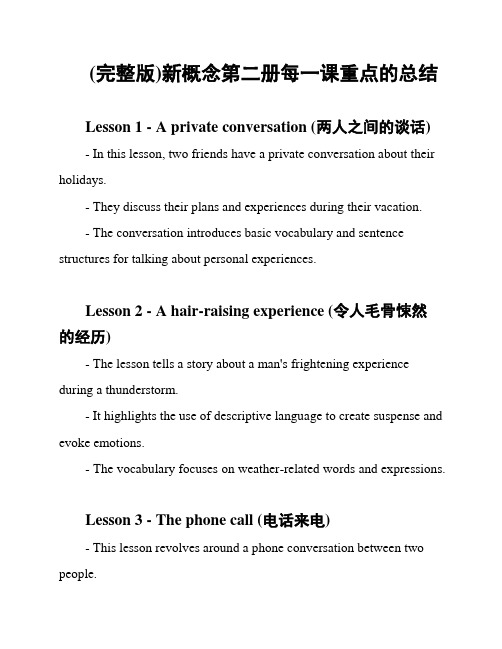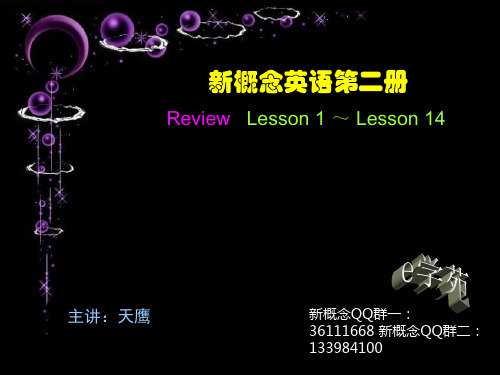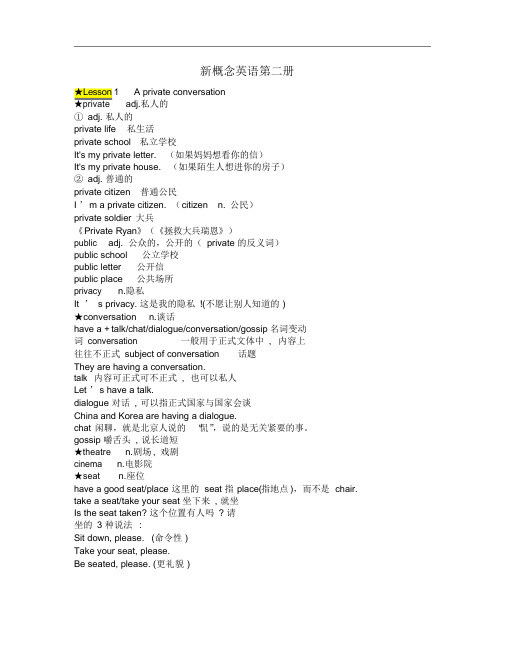新概念英语第二册复习资料
新概念英语2知识点全

新概念英语第二册★private adj.私人的① adj. 私人的private life 私生活private school 私立学校It's my private letter. (如果妈妈想看你的信)It's my private house. (如果陌生人想进你的房子)② adj. 普通的private citizen 普通公民I’m a private citizen. (citizen n. 公民)private soldier 大兵《Private Ryan》(《拯救大兵瑞恩》)public adj. 公众的,公开的(private的反义词)public school 公立学校public letter 公开信public place 公共场所privacy n.隐私It’s privacy. 这是我的隐私!(不愿让别人知道的)★conversation n.谈话have a + talk/chat/dialogue/conversation/gossip 名词变动词conversation 一般用于正式文体中, 内容上往往不正式subject of conversation 话题They are having a conversation.talk 内容可正式可不正式, 也可以私人Let’s have a talk.dialogue 对话, 可以指正式国家与国家会谈China and Korea are having a dialogue.chat 闲聊,就是北京人说的“侃”,说的是无关紧要的事。
gossip 嚼舌头, 说长道短★theatre n.剧场, 戏剧cinema n.电影院★seat n.座位have a good seat/place,这里的seat指place(指地点),而不是chair. take a seat/take your seat 坐下来, 就坐Is the seat taken? 这个位置有人吗?请坐的3种说法 :Sit down, please. (命令性)Take your seat, please.Be seated, please. (更礼貌)作为动词的seat与sit的区别sit(sat,sitten) vi. 就座He is sitting there. 他坐在那儿。
新概念英语第二册复习笔记 第五课 单词学习

新概念英语第二册复习笔记第五课单词学习1.pigeon n. 鸽子(信鸽,肉鸽)dove 和平鸽dove of peace和平鸽homing-pigeon信鸽carrier-pigeon 信鸽one’s pigeon: 某人的职责或责任or: one’s business or responsibility某人的职责或责任eg. I don’t care where the money comes from. That’s not my pigeon.我可不关心钱是从哪里来的,那不是我的责任。
2. message n. 信息,口信[C]eg. A pigeon carried the urgent message from the front.一只鸽子从前线捎回紧急信息。
eg. Pigeons carried messages between his two garages.一些鸽子在两个修车铺之间传递信息。
take a message for sb 为…..捎口信leave sb a message 为…..留口信get the message [俚] 明白,理解,领悟(别人的暗示)eg. She said it was getting late, I got the message and left.她说天已经晚了,我立刻明白然后就离开了。
区别:1. message [C]2. information [U] 情报,资料,信息a piece of information 一条信息information technology ( IT ) 信息技术information science 信息科学3. news [U] 消息,新闻,报道a piece of news 一条消息newspaper [C] 报纸3. cover1) n. (书刊的)封皮cover-girl 封面女郎read a book from cover to cover →read a book from beginning to end.把一本书从头读到尾。
新概念英语第二册01-24复习(可编辑修改版).

新概念英语第二册1-24课Unit1 Review 第一单元复习三部分:1. 必背句子2. 关键句型 3. 难点部分1. It's none of your business.2. I never get up early on Sundays.3. I visited museums and sat in public gardens.4. He has just bought an Australian car and has gone to Alice Springs.5. Up to now, Mr. Scott has sent a great many requests for spare parts and other urgent messages from one garage to the other.6. Everybody knows him.7. A few hours earlier, someone had told the police that thieves would try to steal the diamonds.8. Bill works harder than Joe and grows more flowers and vegetables.9. The clock would strike twelve in twenty minutes' time.10. This clavichord has belonged to our family for a long time.11. He gets a good salary, but he always borrows money from his friends and never pays it back.12. Captain Charles Alison will be away for two months.13. The police will be trying to keep order.14. Do you speak English?15. I knew that my turn had come.16. If you receive a request like this, you cannot fail to obey it!17. She must be at least thirty-five years old.18. I can't pay the bill. I haven't got my bag.19. I might as well have them.20. Fishing is my favourite sport.21. I live near an airport and passing planes can be heard night and day.22. My daughter, Jane, never dreamed of receiving a letter from a girl of her own age in Holland.23. Work on it had begun before my sister left.24. The manager was sympathetic, but he could do nothing.25. He started to complain about this wicked world but was interrupted by a knock at the door.A. 简单陈述句语序a. 1. I enjoyed the film yesterday.2. My mother went to market.3. (This morning) the children asked questions continuously in class4. (on Sundays) we stay at home (on Sundays).5. (This morning) I borrowed a book from the library (this morning).b. 1. She rarely answers my letters.2. The shops always close on Saturday afternoons.3. We never work after six o'clock.4. We sometimes spend our holidays abroad.5. Do you ever buy CDs?B. 动词a. Now and Alwaysb. What happened?c. What has happened?d. What happened? What has happened?1. What __ you __ (buy) yesterday? [did, buy]2. Up till now, he ___ never __ (lend) me anything. [has, lent]3. __ you __ ( burn) those old papers yet? [Have, burnt]4. He __ (fight) in Flanders in the First World War. [fought]5. We __ just __ (win) the match. [have, won]e. What was happening? What happened?1. As my father __ (leave) the house, the postman __ (arrive).[was leaving / left, arrived]2. Tom __ (work) in the garden while I __ (sit) in the sun.[was working / worked, was sitting / sat]3. As I __ (walk) down the street, I __ (meet) Charlie.[was walking / walked, met]4. While he __ (read) the letter, he __ (hear) a knock at thedoor. [was reading, heard]C. must, have to, can and maymust:必须have to:不得不(客观要求)表达请求或询问时,can / may二者可以互换D. a, the and someE. the best and the worst1. It is the most unusual film I've ever seen.2. Mr. Jones is a better teacher than Mr. Brown.3. This book is more interesting than that one.4. She is the laziest pupil in the class.a. 单音节词,一般直接在词尾加-er,-est.特殊情况:以-e结尾:直接加r / st以-y结尾:变y为i再加er / est以一个元音+ 辅音结尾:双写末尾辅音,再加er / estbigger, strongest, taller, larger, shiest …b. 双音节词,除以-y结尾的双音节形容词,先变y为i再加er和est外,其他绝大多数双音节词是分别在此前加more和mostc. 多音节词都是分别在前面加more和mostmore interesting, the most successfuld. 不规则词good / well, bad / ill, little, many / much, far, oldF. in, on, atG. 动介搭配1. by the way:顺便问一下on the way:在… 的路上2. borrow from:从… 借来lend sth. to sb.:把… 借给3. ask questions:问问题ask for help:求助4. grow:成长(动作,过程)grow up:成熟,长大5. beside:在… 旁边besides:除此之外6. it's - it is ; it hasits 所有格代词,它的7. yet通常用在疑问句或否定句中,表示“某事预期发生,却还未发生”Is dinner ready yet? I'm starving.still 表示"因某事持续的时间比预期的要久而惊讶的"Is it still raining?8. on one's desk:在某人桌上in one's office:在某人办公室9. it is 指代;形式主语;天气(adj. / v.)there be:有;there be sb. doing sth. ; 天气(n.)10. stay at home:待在家in my house:在我房子里词汇重点讲解一:近义词/ 用法seat n.座位seat / sitvt. 及物动词坐下seat + oneselfseatedThey seated themselves on the grass.他们在草地上坐下Be seated, please.请各位落座吧I found the girl seated in the chair, crying loudly. 我发现小姑娘坐在椅子上大声哭泣sit vi.sit down:坐下stand up:站起来loudly loud / aloud / loudlyloudadj. 声音响亮的His voice is loud.他的声音响亮adv.Can you speak louder, please? (副词比较级)您能再大声一点么aloudadv. 大声地(can be heard 重点在于出声)[formal]正式场合使用He read一般过去时the letter aloud to us. 大声读信She cried aloud in protest. 大声抗议loudly adv. 副词意思和loud作副词时一样,但是搭配位置不同① loud 只能放在动词后面speak / talk / laugh loud② loudly 可以放在动词前后speak / talk / laugh loudlyThe audience laughed loudly at the joke.台上有人讲笑话,下面的人大声笑The cock loudly crows outside my window.公鸡在我窗户外面大声啼鸣。
(完整版)新概念第二册每一课重点的总结

(完整版)新概念第二册每一课重点的总结Lesson 1 - A private conversation (两人之间的谈话)- In this lesson, two friends have a private conversation about their holidays.- They discuss their plans and experiences during their vacation.- The conversation introduces basic vocabulary and sentence structures for talking about personal experiences.Lesson 2 - A hair-raising experience (令人毛骨悚然的经历)- The lesson tells a story about a man's frightening experience during a thunderstorm.- It highlights the use of descriptive language to create suspense and evoke emotions.- The vocabulary focuses on weather-related words and expressions.Lesson 3 - The phone call (电话来电)- This lesson revolves around a phone conversation between two people.- The dialogue also includes expressions for making suggestions and giving advice.Lesson 4 - A famous monastery (一座著名的修道院) - The lesson describes a visit to a famous monastery.- It introduces vocabulary related to religious buildings and their surroundings.- Additionally, it provides practice in forming questions and giving short answers.Lesson 5 - A trip to Australia (澳大利亚之行)- In this lesson, a young girl talks about her trip to Australia.- Vocabulary related to travel, geography, and animals is presented.Lesson 6 - A rainy Saturday (一个雨天的星期六)- The lesson portrays a girl's activities on a rainy Saturday.- It introduces vocabulary relevant to hobbies and leisure activities.- The use of present continuous tense is emphasized to describe ongoing actions.Lesson 7 - Money, money, money! (金钱,金钱,金钱!)- This lesson explores the influence of money on people's lives.- It introduces vocabulary related to finance, business, and personal finances.- The dialogue highlights the use of modal verbs for making suggestions and giving advice.Lesson 8 - Mr. Hiker (远足先生)- The lesson narrates Mr. Hiker's experience hiking in the mountains.- Vocabulary related to nature, camping, and hiking is presented.- The past simple tense is practiced to describe past events.Lesson 9 - No parking (禁止停车)- This lesson focuses on the concept of parking restrictions.- Vocabulary related to road signs, transportation, and rules is introduced.Lesson 10 - Cycling for charity (骑自行车为慈善事业)- The lesson discusses a charity event involving cycling.- Vocabulary related to sports, charity, and participation in events is presented.- The dialogue emphasizes the use of phrasal verbs and expressions related to physical activities.Lesson 11 - Adventure sports (冒险运动)- In this lesson, different adventure sports are introduced and discussed.- Vocabulary related to extreme sports, risk-taking, and outdoor activities is presented.- The lesson also focuses on the use of present perfect tense to describe past experiences.Lesson 12 - Life in a big city (大城市的生活)- The lesson describes the advantages and disadvantages of living in a big city.- It introduces vocabulary related to urban life, city services, and facilities.- The dialogue includes phrases for expressing opinions and preferences.[...continued...]。
新概念英语第二册Lesson_1-Lesson_14重点复习

Review Lesson 1 ~ Lesson 14
主讲:天鹰
新概念QQ群一:36111668 新概念QQ群二:133984100
请选择题号
look at, see, watch的辨别;listen to, hear的辨别
looking at see The boy is ____________ the blackboard but he can’t _____ anything.
1. He has gone to Beijing. 2. He has been to Beijing.
现在完成时
现在完成时表示当前已经完成的动作, 其基本句型结构为:have/has+过去分词 I have just received a letter from my brother. He has already finished his homework. He has been there for six month. I haven’t heard from him since 2008. Have you read this book yet? The boy has not seen his pen pal yet. 请用just,already,yet分别造一个句子。
比较级和最高级
Franklin’s
Tim’s
Jerry’s
enter和enter for
enter He is very ill. Nobody is allowed to ____________ his room. enter for Will you ____________ this week’s crossword competition. Many athletes have ____________ the Olympic Games this year.. entered for No one saw the thief when he ____________ the building. entered
新概念英语第二册笔记(全部96课全)(精选)

新概念英语第二册★Lesson 1 A private conversation★private adj.私人的① adj. 私人的private life 私生活private school 私立学校It's my private letter. (如果妈妈想看你的信)It's my private house. (如果陌生人想进你的房子)② adj. 普通的private citizen 普通公民I ’m a private citizen. (citizen n. 公民)private soldier 大兵《Private Ryan》(《拯救大兵瑞恩》)public adj. 公众的,公开的(private 的反义词)public school 公立学校public letter 公开信public place 公共场所privacy n.隐私It ’ s privacy. 这是我的隐私!(不愿让别人知道的)★conversation n.谈话have a + talk/chat/dialogue/conversation/gossip名词变动词conversation 一般用于正式文体中, 内容上往往不正式subject of conversation 话题They are having a conversation.talk 内容可正式可不正式, 也可以私人Let ’s have a talk.dialogue 对话, 可以指正式国家与国家会谈China and Korea are having a dialogue.chat 闲聊,就是北京人说的“侃”,说的是无关紧要的事。
gossip 嚼舌头, 说长道短★theatre n.剧场, 戏剧cinema n.电影院★seat n.座位have a good seat/pla c,e这里的seat指place(指地点),而不是chair. take a seat/take your seat 坐下来, 就坐Is the seat taken? 这个位置有人吗?请坐的3 种说法:Sit down, please. (命令性)Take your seat, please.Be seated, please. (更礼貌)作为动词的seat与sit 的区别sit(sat,sitten)vi. 就座He is sitting there. 他坐在那儿。
新概念英语第二册-目录-语法总结
Unit 01
Lesson 1 A private conversation私人谈话
Lesson 2 Breakfast or lunch?早餐还是午餐?
Lesson 3 Please send me a card请给我寄一张明信片
Lesson 4 An exciting trip激动人心的旅行
Lesson91 Three men in a basket三人同篮
Lesson92 Asking for trouble自找麻烦
Lesson93 A noble gift崇高的礼物
Lesson94 Future champions未来的冠军
Lesson95 A fantasy纯属虚构
Lesson96 The dead return亡灵返乡
定冠词the的用法;some与any的区别
过去进行时与一般过去时;use to的用法
比较结构表示法;Little和few的用法
用于表示目的和方向的介词和副词
被动语态用法补充
Will和be going to
一般将来完成时;将来完成进行时
过去完成时与从属连词when,before,after,until
Lesson58 A blessing in disguise?是因祸得福吗?
Lesson59 In or out?进来还是出去?
Lesson60 The future卜算未来
Lesson61 Trouble with the Hubble哈勃望远镜的困境
Lesson62 After the fire大火之后
Lesson21 Mad or not?是不是疯了?
Lesson22 A glass envelope玻璃信封
新概念英语第二册复习笔记 第三课 单词学习
新概念英语第二册复习笔记第三课单词学习1. send寄,送,派遣,打发cause sb. to go or sth. to be taken without going oneself( send – sent – sent )1) 加双宾语send sb. sth.= send sth. to sb.send me a card = send a card to me 寄给我一张明信片eg. I sent my mother a present on Mothers’ Day = I sent a present to my mother on Mothers’ Day. 在母亲节那天我寄给我母亲一件礼物。
2) 加单宾语send sthsend sbsend a letter 寄一封信send a parcel 寄一件包裹send the children to bed 打发孩子去睡觉3) send sb my love 代向某人致意give sb my love 代向某人致意eg. Please send your sister my love .= Please send my love to your sister.请代向你姐姐问候。
eg. Please say hello to your brother. = Please say hi to your brother.代我问候你哥哥。
eg. Remember me to your parents. 代我问候你父母。
Give my regards to your parents. 把我的问候带给你父母。
4) send for sbsend for sthsend for a doctor 派人去请医生send for a taxi 派人去叫一辆出租车2. postcard n. 明信片card 卡片,贺卡a Christmas card 圣诞卡片a birthday card 生日卡片a get-well card 康复卡an identity card 身份证cards 纸牌a pack of cards 一幅纸牌1) one’s best card 某人的王牌,绝招or: one’s strongest card某人的王牌,绝招2) give sb his cards 开除,解雇3) lay one’s cards on the table = put one’s cards on the table 摊牌post n./v. 邮,寄post-bag 邮袋post-box ( U.S., mail box ) 邮筒,邮箱post-code 邮政编码post office 邮局postman ( U.S.,mailman) 邮递员post mark 邮戳post-free (邮件)免付邮资的,邮资已付的post-paid邮资已付的3. spoil使索然无味,损坏,破坏,糟蹋spoil-spoiled-spoiledspoil-spoilt-spoilt英式英语中多用不规则形式:eg. dreamt; spoilt ( Br. )美式英语中多用规则形式:eg. dreamed; spoiled ( Am.)过去分词作定语时,用不规则形式:a spoilt child 一个被惯坏了的孩子spoilt milk 已经坏了的牛奶a misspelt word 拼写错误的字1) v. make sth useless, valueless or unsatisfactory; ruineg. Bad weather spoilt our holidays.恶劣的天气破坏了我们的假期使我们玩得不开心。
新概念第二册总复习(1-48课)
现在进行时
(2) 有些动词通常不能用进行时。不能用进行时的动 词有: 表示感觉或感情的词,如:hear, see, smell, taste, feel,(感官动词) seem, notice, hate, love, like, want, wish, refuse, prefer, forgive等。 表示存在或所属的词,如:exist, stay, remain, obtain, have, own, form, contain等。 表示认识或理解的词,如:understand, know, remember, forget, believe, think, doubt等。
It's raining again. I am coming to see you. But I'm still having breakfast. What are you doing? I'm having breakfast.
L5 I am coming to see you. 讲解:类似come ,arrive, go,start 等单 词进行时态可以表达将来含义。 I am arriving soon.
过去进行时 L1
L2 A young man and a young woman were sitting behind me. 讲解:这个一个典型的过去进行时态的句子。
过去进行时主要表示过去某个时刻正在发 生的一个动作。 一般过去时和过去进行时的基本差别是: 一般过去时表示一个已经完成的动作,而 过去进行时表示过去一个正在进行的动作。 She wrote a letter yesterday.(已经写完) She was writing a letter.(可能还没有写完)
新概念英语第二册知识点梳理
Lesson 14 Do you speak English?
Lesson 15 Good news
Lesson 16 A polite request Lesson 17 Always young Lesson 18 He often does this! Lesson 19 Sold out
Lesson 20 One man in a boat
musical, instrument, recently, damage, key, string, shock, allow, touch turn, deserve, lawyer, bank, salary, immediately Luck, captain, sail, harbour, proud, important
并列句中的语序 经常发生的事情的表达,如:Do you always get up so late? / The sun rises in the east and sets in the west. / I hear that you like classical music.
一般过去时(参考第 3 课)
一般过去时(参考第一册第 67-78 课)
现在完成时(参考第一册第 83-90 课)
一般过去时与现在完成时的区别
a, the 和 some 的用法
过去进行时,表示过去某个时刻正在 发生的动作或状态,如:When I was watering the garden, it began to rain. 比较级和最高级(参考第一册第 107-112 课) 表示时间的短语,如:at 9 o’clock, at night, in ten minutes, in 1939, in summer, in August, in January, in the afternoon, on Tuesday, on April 27th, from 9 till 5, during the night, until 10 o’clock
- 1、下载文档前请自行甄别文档内容的完整性,平台不提供额外的编辑、内容补充、找答案等附加服务。
- 2、"仅部分预览"的文档,不可在线预览部分如存在完整性等问题,可反馈申请退款(可完整预览的文档不适用该条件!)。
- 3、如文档侵犯您的权益,请联系客服反馈,我们会尽快为您处理(人工客服工作时间:9:00-18:30)。
新概念英语第二册复习资料
新概念英语第二册复习资料
随着全球化的发展,英语已经成为一门不可或缺的语言。
而在学习英语的过程中,掌握好基础知识是非常重要的。
新概念英语第二册是一个非常经典的教材,它涵盖了许多重要的语法和词汇知识。
在这篇文章中,我们将回顾一下新概念
英语第二册的一些重要内容。
首先,我们来谈谈第二册的语法部分。
在这本教材中,我们学习了一些基本的
语法知识,比如动词的时态和语态变化。
通过学习这些知识,我们可以更好地
理解英语句子的结构和意义。
例如,我们学习了一般现在时、一般过去时和一
般将来时的用法。
这些时态的掌握对于我们正确表达过去、现在和将来的事件
非常重要。
除了时态,我们还学习了被动语态的用法。
被动语态在英语中非常常见,它可
以帮助我们更好地描述事件的发生。
通过学习被动语态,我们可以更加灵活地
运用英语来表达自己的意思。
另外,第二册还包括了一些重要的词汇。
词汇是学习一门语言的基础,掌握好
词汇对于我们的语言表达非常重要。
在第二册中,我们学习了一些常用的动词、名词和形容词。
通过学习这些词汇,我们可以更加丰富我们的词汇量,从而更
好地理解和运用英语。
除了语法和词汇,第二册还包括了一些阅读理解和听力练习。
通过这些练习,
我们可以提高我们的阅读和听力技巧。
阅读理解可以帮助我们更好地理解文章
的意思,而听力练习可以帮助我们更好地理解和运用英语的听力技巧。
在学习新概念英语第二册的过程中,我们还可以通过一些其他的学习资源来提
高我们的英语水平。
比如,我们可以通过听英语歌曲来提高我们的听力技巧和语感。
我们还可以通过阅读英语文章来提高我们的阅读理解能力。
此外,我们还可以通过参加英语角或者找一个英语学习伙伴来提高我们的口语表达能力。
总之,新概念英语第二册是一个非常重要的教材,它包含了许多重要的语法和词汇知识。
通过学习这本教材,我们可以提高我们的英语水平,更好地理解和运用英语。
除了教材本身,我们还可以通过其他的学习资源来提高我们的英语能力。
希望大家能够认真学习新概念英语第二册,并且在学习过程中保持积极的态度和坚持不懈的努力。
相信只要我们努力学习,就一定能够取得进步!。
